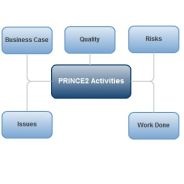
- Project Management
Home » Free Resources » »

Why Study Project Management? Top 5 Reasons
- Written by Contributing Writer
- Updated on October 6, 2023

Project management forms the lion’s share of what helps modern organizations run like a well-oiled machine. So, if you’re wondering – “why study project management?” The simple answer is that it’s a booming career.
Plus, there are more project management roles to fill than qualified people in the field. This talent gap pushes the demand for skilled professionals even higher.
But that’s not all. There are more reasons to study project management. Whether you’re looking to build a career in this field or want to sharpen your managerial skills, this guide will dive into how studying project management in a project management bootcamp can benefit you.
What is Project Management?
PMI.org defines project management as:
“Project management is the use of specific knowledge, skills, tools, and techniques to deliver something of value to people. The development of software for an improved business process, the construction of a building, the relief effort after a natural disaster, the expansion of sales into a new geographic market—these are all examples of projects.”
Project management is the structured approach to completing key project objectives. You can ensure successful outcomes with tactical knowledge, methods, and skills.
When projects have well-defined timelines, sticking to the schedule is necessary. Project Management also involves financial oversight so that the project remains well within the budget constraints.
We can break project management down into five phases:
- Initiation and Discussion
- Reporting and Closing
These phases outline a clear roadmap that people can understand and follow to complete the project on time and successfully.
Also Read: Top Project Manager Interview Questions and Answers
What Do You Study in a Project Management Degree?
Project management is a multi-faceted field. It can be applied to virtually every sector. Every industry finds some application of it. You will find that many different subjects are covered in this course. Here is a rundown of the major topics a good project management program covers.
Decision-making: Project managers must make informed decisions to ensure project success. This involves critical thinking and problem-solving skills.
Business analytics: Understanding data and analytics is crucial for optimizing project performance and making data-driven decisions.
Accounting: Financial insight is essential to managing project budgets and allocating resources efficiently.
Data Analytics: Leveraging data analytics tools and techniques to extract valuable insights for project improvement.
Project Management Methodology: Learning established project management frameworks like PMI’s PMBOK or Agile methodologies.
Project Management Processes: Understanding the lifecycle of projects, from initiation to closure, and the processes involved at each stage.
Conflict Resolution: Developing skills to manage conflicts and maintain team cohesion.
Human Resources: Managing project teams, including hiring, training, and performance evaluation.
Risk Management: To ensure project success, identify, assess, and mitigate risks.
Communication: Effective communication is vital for coordinating project activities and keeping stakeholders informed.
Actuarial Science: Understanding actuarial principles may be necessary for risk assessment and forecasting, depending on the industry.
Entrepreneurship: Entrepreneurship concepts can be valuable for those involved in innovative projects.
Information Systems: Utilizing technology and information systems to streamline project processes.
Corporate Social Responsibility: Understanding ethical and social responsibilities in project management.
Organizational Development: Nurturing organizational growth and adaptability through projects.
This is how a project management course equips you with the skills needed to tackle industry issues and challenges.
Why Study Project Management, and What Makes Project Management a Promising Career?
Project management is not simply a necessity of the times. It also offers numerous advantages and opportunities. For example, there has been a six percent increase in project management jobs in just one year – from 2022 to 2023, according to the US Bureau of Labor Statistics .
In this section, we’ll explore the compelling reasons why choosing a career in project management can be a smart move.
High Demand for Project Managers
The demand for skilled project managers is on the rise globally. Companies across various industries seek professionals who can efficiently transform concepts into tangible outcomes.
Enrolling in a project management course makes you invaluable to organizations, thanks to the skills you get. In today’s job market, top companies whisk competent project managers away. Hence, it is a great time to delve into project management.
Versatile Skill Set Across Industries
Project management expertise is highly versatile. It has so many applications in different industries. A project management certification in your name opens doors to many industries and sectors. This way, you will be more open to pursuing a career aligned with your passion.
Whether in engineering, construction, finance, law, healthcare, or technology, your project management qualification is valuable.
Lucrative Compensation Packages
Earning potential in project management is enticing. Salaries for project managers vary by sector and experience but often reach substantial figures. For instance, project managers in finance have an average salary of about $78,000 per year, according to Payscale .
While this is the median salary, your income can vary based on your sector, specific projects, employer, qualifications, and experience.
Accelerated Career Advancement
A project management qualification isn’t just a ticket to high-paying jobs; it’s also a catalyst for career advancement. Project management encompasses an array of skills, including leadership and teamwork.
You gain proficiency in managerial and leadership roles with a project management certification. Coupled with a track record of successfully executing high-level projects, you can expect rapid career growth. You’ll find yourself moving into more exciting and higher-paying positions at a faster pace.
Enhanced Productivity and Business Acumen
Project management not only gives you professional skills, but it also gives you a personal boost. Even if you don’t aspire to be a top-tier project manager, project management skills can significantly boost your productivity and business acumen at a personal level. These skills enable you to stay focused and efficient at work.
Whether you’re an entrepreneur or part of a larger organization, you can apply the knowledge from a project management course to improve your professional effectiveness.
Also Read: Program Manager vs. Project Manager: Here Are the Differences You Should Know
Types of Project Management Jobs
If you study project management, it opens the doors to a wide array of career opportunities. Let’s take a quick look into various project management roles, what they do, and the average salary of these roles.
Construction Project Manager
Construction project managers oversee building projects from start to finish. As a project manager, you must manage budgets, coordinate with subcontractors, and ensure compliance with regulations and permits. The average salary for this role is around $92,141 per year.
Marketing Project Manager
Marketing project managers specialize in planning, managing, and executing marketing campaigns. They identify necessary skills and resources, ensure projects stay within budget, and supervise campaign teams. They have an average salary of $65,436, according to Indeed .
Architectural Project Manager
The role of an architectural project manager encompasses leading projects from budgeting to implementation. You must visit construction sites, provide recommendations, procure construction bids, and oversee the entire architectural project. You can expect an average annual salary of $87,526 , depending on your experience.
Engineering Project Manager
An engineering project manager must plan, direct, and coordinate the development of new products, designs, and processes. You also lead research and development, create project plans, and manage budgets and staffing. It is a great position with an annual average salary of $101,717.
Systems Project Manager
Systems project managers play a hands-on role in planning, designing, and executing projects, often requiring computer and business operating systems expertise. These roles receive an average annual salary of $99,991 .
Electrical Project Manager
Electrical project managers handle large commercial electrical projects. They manage staff, delegate tasks, and oversee the full scope of electrical construction and maintenance projects. It is a lucrative position with an average salary of $97,949 annually.
IT Project Manager
They are tasked with overseeing a company’s IT department, ensuring the realization of IT strategies and successful project completion. They have salaries of an annual average reaching $99,010
While these are only some major roles, you will find it a much-needed skill in many industries. As you consider your career path, these roles serve as valuable starting points for exploring the possibilities of the world of project management.
Enter the Exciting and Rewarding World of Project Management
In a world heavily reliant on effective business processes, the demand for project management skills won’t decline anytime soon. It’s a great time to obtain these skills through an industry-recognized project management certification .
Delivered by Simplilearn in collaboration with the University of Massachusetts, this expert-led program teaches you the essential frameworks, practical tools, and digital skills to manage complex, transformational projects.
Whether you aspire to lead projects in the digital age or enhance your current project management expertise, this program offers a comprehensive learning experience. While you study project management in this course, get hands-on training and scope to apply your learning to real-world scenarios through capstone projects. As a program graduate, you’ll gain a certificate of completion and official UMass Amherst Alumni Association membership, opening doors to invaluable opportunities.
You might also like to read:
Project Leader: Responsibilities, Job Description, Salary & Everything You Should Know
Is Project Management a Good Career? Here’s What You Need to Know
What is Project Management? Tools, Process & Everything You Should Know
Project Management Qualifications: All You Need to Know
How to Ace the PMP Exam? A Comprehensive Guide
Leave a Comment Cancel Reply
Your email address will not be published. Required fields are marked *
Recommended Articles

Career Tips: How to Handle Project Failures?
Understanding why projects fail is the key to preventing future setbacks. Learn how to handle project failures and turn them into valuable learning experiences.

Ensuring Project Success: What is the Critical Path Method in Project Management?
The critical path method in project management helps identify tasks that affect a project’s timeline. Learn its basics and how to apply it to keep complex projects on track.

What is a Stakeholder in Project Management?
Understand the role of stakeholders in project management. This guide explains who they are, why they matter, and how to manage them for successful project delivery.

WBS in Project Management: What It Is and How You Use It?
Discover the significance of Work Breakdown Structure (WBS) in project management on the UMass Amherst Boot Camps blog. Learn what WBS is and how it can streamline your project planning and execution process.

What is Quality Management? A Complete Guide
Quality management is the key to project excellence. Explore our guide to answer the question “What is quality management?” and what its benefits, principles, and methods include.

Project Management Qualifications: Here’s What You Need to Know
This article provides an in-depth look at project management qualifications, including what it entails, eligibility, requirements, a solid career path, and why certification is a good idea.
Project Management Bootcamp
Learning Format
Online Bootcamp
Program benefits.
- 25 in-demand tools covered
- Aligned with PMI-PMP® and IASSC-Lean Six Sigma
- Masterclasses from top faculty of UMass Amherst
- UMass Amherst Alumni Association membership

4 Compelling Reasons Why You Should Absolutely Study Project Management.
Check out these products.

Featured links
- Terms & Conditions
- Cookie Policy
- Affiliate Program
Connect with us
PMI®, PMP®, PgMP®, PfMP®, CAPM®, PRINCE2®,ITIL®, Network and the PeopleCert® Authorised Training Organisation logos are registered trademarks of respectively the Project Management Institute, PeopleCert, AXELOS, GamingWorks and PECB
Sign in/up with Google
Sign in/up with Facebook
Sign in/up with Linkedin
Sign in/up with Apple
Sign in/up with Twitter
This field, is required.
You have not accepted the "Terms & Conditions".
- Skip to content
Study with us
We make sure that every student has a hands-on education that’s filled with adventure.
- Study with us overview
- Applying to university overview
- Admission requirements
- Application dates
- Starting at the University overview
- Accepting and enrolling
- Orientation and settling in
- Find your course overview
- Undergraduate courses
- Postgraduate courses
- Double degrees
- Online courses
- Research degrees
- Short courses
- Pathways to university
- Where study meets sustainability
- Learning abroad
- Scholarships, fees and costs
- Our accommodation
- International students
- Our agent partners
There’s more to uni than studying. Learn how you can connect with new people through events, sports, volunteering opportunities, and more.
- Uni life overview
- Our campuses overview
- Cradle Coast
- Transforming our University
- Experience Tasmania
- Our accommodation overview
- Support and wellbeing
- Clubs and societies
- Sport at the University
- Aboriginal students - Riawunna Centre
Our research
We are proud of our research excellence, which delivers impact for and from Tasmania.
- Our research overview
- Discover our expertise
- Research partnerships & innovation
- Research support
- Research institutes and centres
- Research facilities and infrastructure
- Research stories and insights
- Research degrees overview
- What is a research degree?
- Scholarships and fees
- Available projects
- Apply to become a research student
For community & partners
We pride ourselves on forming deep connections, collaborating not just with one another, but with local industry, schools, and everyone who calls our island home.
- For community & partners overview
- Community and public engagement
- For schools overview
- Subscribe for student activities updates
- Aboriginal networks and resources overview
- Aboriginal Business
- For alumni overview
- News and publications
- Giving overview
- Donate to the University
- Donate to scholarships
- Arts and cultural collections
- Partner with us overview
- Educational partnerships
- Business, industry, and government partnerships
- Tasmanian Policy Exchange
Tasmania is an island of creative and curious minds. No matter where you join us from, you’ll become part of a welcoming and collaborative community.
- About us overview
- Governance, leadership and strategy
- Sustainability
- Inclusion, diversity and equity
- Public reporting
- Lutruwita Aboriginal Tasmania
- Our colleges and schools
- Safety, security and wellbeing
- News and stories
- Events overview
- Our Open Day events
- Graduation ceremonies
- Working at the University overview
- Current job opportunities
- Casual registration
- Applying to work with us
- Contact us overview
- Raising concerns and complaints
How can we help you?
I'm interested in, are you an international student.
We want to provide content that's relevant to you. Your options are stored in a browser cookie which you can delete at any time via the link below.
Choose a login
6 reasons to study project management.
Studying project management can lead to a fulfilling career, or just brush up on your organisation skills.
Study 09 Jan 2020
- Business and Economics
- Tasmanian School of Business and Economics
- Schools and Community
- Business and Law
- twitter Twitter
- facebook Facebook
- linkedin LinkedIn

Knowing how to successfully manage a project from start to finish can be the difference between success and failure. It is an increasingly in-demand skill and studying it can boost a career in any industry.
Project management is as broad as the potential projects it manages, from making it a career as a Certified Project Officer, to effectively tackling and managing projects within normal team environments, to learning to manage workload, deadlines and organisation in general.
There are many reasons to study project management, whether you’re seeking a career as a Project Officer, or just want to learn new and build on project planning skills. The Project Planning short course offered online by the University of Tasmania provides an excellent introduction to rich and fulfilling world of project management. Here are the top six of the many reasons to study project management.
1. There is a strong demand/ skill shortage
A search on Seek.com.au in December 2019 listed over 31,000 jobs related to the words ‘project management’, so there's no shortage of jobs in this field. Learning how to effectively manage a project is becoming an essential and transferable skill and is becoming increasingly in-demand across all industries.
2.There are a variety of industries it applies to (e.g. IT, manufacturing, construction)
Project managers are required in every industry, including in the Government sector and small-to-medium enterprises, covering a wide range of job roles that require project management skills. A career in project management could take you anywhere, including the capacity to work as a consultant and be your own boss. With the Project Planning short course, you could go on to complete all four short courses in project management and become a certified Project Officer with the Institute of Project Management . It can also be a pathway into a business degree at the University.
3. It is a skill highlighted by employers
Most employees are asked at some point to work on a specific activity that has a deadline – project management knowledge and methodologies ensure you meet the employer’s requirements. Having the capacity to manage projects as they arise shows initiative and can give you the edge when in the increasingly competitive job market.
4. Improves your productivity at work
Project management provides you with a range of tools and techniques that you can apply in your work role to ensure that you are more productive and more able to meet the required deadlines. It doesn't have to relate directly to projects, it could be improving your day to day organisation with new tools and tricks taught in the short course.
5. Improves your career advancement opportunities
Project management is a skill that enables you to operate at a higher level, as it incorporates aspects of teamwork and leadership. Being able to effectively organise and carry out high level projects and holding qualifications in this area can help you advance your career. Being a qualified Project Officer can also add another feather to your cap.
6. Provides an opportunity to be at the forefront of exciting projects
Your knowledge of project management means that your employer can look to you to be part of, or deliver, the various workplace projects that are necessary in organisations. Project management gives you the skills to identify and spearhead projects, meaning you have the capacity to improve your workplace and outputs. Identifying issues in the workplace and having the capacity to change them is a core part of project management.
The Project Management: Project Planning short course at the University of Tasmania is a free online course which provides an excellent introduction to project management, introducing you to the first steps of project management, such as how to build your business case, effectively scope your project, and proven methods to identify and mitigate potential risks.
Register now for the Project Planning free Short Course and see where project management takes you. Register on our short courses website .
The University of Tasmania uses cookies to deliver content that’s relevant to you. We rely on cookies to remember your preferences, provide personalised content, and to analyse our website traffic. You consent to our cookies if you click “Accept”. Please refer to our privacy policy for more information.
- Essential functionality (required) - these cookies are needed for this website to run and are always turned on.
- Personalisation and preferences - these cookies help us remember your preferences and deliver a more personalised experience.
- Personalisation and analytics - these cookies help us gather non-identifiable data about the way our site is used and to help us make improvements.
- Marketing and promotion
Voices Blog

The Benefits of Studying Project Management
No matter your field or career trajectory, this toolkit will make you shine.
You wouldn’t think it, but even a trip to the grocery store is a project. This is instructor Anthony Minstein’s take on it:
“Almost everything we do in business—and personal life—is a project. Something as simple as going to the grocery store is a ‘project,’” he explains, breaking it down as such:
Planning: What meals need to be prepared? Analysis: What groceries are needed? Scheduling: When can we go? Execution: Going to the store, filling our cart and paying. Project close: Oh, no—we forgot to get mustard!
“We may not create formal project management deliverables, other than a shopping list,” Anthony continues, “but we follow the definition of a project : a specific start and end culminating with a unique product or service.”
You may not realize it, but you’re flexing project-management skills every day—both at work and in your personal life.
Getting a new product to market? Check! Project management.
Planning a family vacation? Check! Project management.
So why take a project management course if you’re already doing this?
Check Out the Top 5 Reasons
I asked five of our esteemed project management instructors this very question and their answers jibe along the same line: The hard and soft skills you learn in our project management courses can take you from great to stellar!
Let’s Meet Our Project Management Panelists

Fabio De Martino , PMP, Global Head Quality Strategy and Operations, Kite Pharma
His main responsibilities are identifying, leading and delivering key company projects and programs, and driving organizational effectiveness.

Helena Weiss-Duman , PMP, Deputy Director of External Relations and Marketing Communications at UC Berkeley
Helena has lectured at UC Berkeley Extension since 2007 and was named an Honored Instructor .

Evelyn Launius , M.B.A., Ph.D., PMP
Evelyn has more than 25 years of project management expertise leading strategic initiatives for both public and private sectors. In her role as a global project manager, she has utilized project methodologies that include Waterfall and Agile to support implementation of technology and business solutions in industries such as health care, government and energy.

Catherine Pinkas , PMP
Catherine has been a project management professional for more than 20 years, managing projects in a variety of industries, including finance, construction, information technology, hospital management, business development and events management in the public and private sectors.

Anthony Minstein , PMP, SSMBB
Anthony is Solutions Delivery Principal for Technology Advance Partners. He has more than 40 years as program and project manager for IT and commercial software companies. Anthony began instructing with us in 1994, and has held instructional positions at University of San Francisco and Cal State Dominguez Hills.
There is not a business today that cannot use some aspect of project management in a very fluid way. It becomes part of your leadership and management skill set. —Catherine Pinkas
What is the value of having project management skills on your résumé no matter the industry or position?
Evelyn: I relate to this question because I was that student—albeit it many years ago. Throughout my career, I randomly took project management classes to further skills in planning and executing work . I soon recognized improvements in my interpersonal skills, such as listening, flexing, motivating and patience. Decades later, I became motivated to attain PMI Ⓡ certifications . Having project-management skills enables individuals to improve their personal and/or professional effectiveness.
Catherine: I believe that project management is integrated into all business processes. I learned very early on in my business career—moving through different industries—that I had to be extremely well organized in terms of what I was trying to accomplish in order to be productive in an organization. A great deal of my work has been based on my ability to structure what I was doing to make sure that I had the resources, the money and the time frame to be able to complete the work. A systematic way of being able to track a project to success was also very important. Even today, up to 70 percent of projects fail because they did not meet their goals. Learning project management gives you the language, tools and techniques to be able to plan and successfully recognize obstacles when they appear and then successfully work through them. It doesn't matter whether it's a large or a small project—the same mindset applies to what needs to be done. There is not a business today that cannot use some aspect of project management in a very fluid way. It becomes part of your leadership and management skill set.
Fabio: Maybe 20 years ago, it was a nice-to-have skill set. But today, as a hiring manager, if I see that there is this type of skill set or even a certification on a résumé, it is going to jump to the top of the stack. Having the certificate or even a single course gives a common vocabulary that somebody can utilize right away in the workplace. No matter the level at an organization—entry-level, seasoned executive—everybody is going to talk about a project start and end date. Do we have a project charter—a common understanding of what we are working on? Do we have a timeline? Where do we see risk? This is what students realize during the Project Management course : “I always faced this problem with scheduling. And I see that there’s another course about scheduling .” I see students get excited about the next course to go deeper into a certain area. When they talk with their employer, or whomever approves their budget , about taking other courses, they say, “Hey, this is a great value-add for the company.” And I think this is great to match to employer’s eagerness to develop their people and our eagerness to share best practices in each course.
Helena: In any business, there will be stretch assignments that will need project-management skills. By learning these tools, you will have the confidence and ability to take on those projects, which can make you more valuable to your team. Simple things like learning how to do a scope statement keeps you organized. For a project, if you don’t know where to start, putting it into a framework such as a scope statement can bring order to chaos and allow everyone to move forward together more quickly.
Project management incorporates both hard and soft skills. How would someone finishing the introductory Project Management course apply both sets of skills to their work?
Fabio: We are living in a world where the two are blending together and becoming core skills. You need to be a people person but also negotiate time and resources through a timeline. Merging the two and working together to help you achieve your goals—that makes the team successful .
Catherine: A project manager is just the hub of the wheel. You’re working with people who need a system to communicate what they need in order to be effective. If a scope has to change, if scheduling is a problem, if it looks like something is going to cost more or you don't have enough resources, people on the team have to be able to recognize that. And the job of the project manager is to make sure that all of those requirements are available. So it's not the project manager really doing everything, but it's a project manager working with a high-performing team; when they see an obstacle, they bring it to the table and we all work together on whatever is needed. Learning the skills to always communicate with the sponsor of the work, with your team, support staff, customers and suppliers who may be involved, as well as stakeholders—people who are not necessarily very friendly to a project or who will be impacted negatively if the project doesn't go well. Project management helps you identify those groups so that you don't miss people. And then you develop a communication plan and a strategy to be able to inform them about what is going on and what needs to be done. That collaboration makes for better quality. As instructors, we bring examples to the fore. When we introduce the idea of scope—identifying what work needs to be done—that's universally applicable. The Project Management class starts to identify the key elements to success.
Helena: For example, stakeholder analysis is the practice of understanding the project from multiple perspectives, which is a great soft skill. Project management is 90-percent communication so it’s always great to obtain more comms skills, meeting management and follow-up, and keeping people accountable in an empathetic way. People will be so happy because they know that you won’t let things fall through the cracks. I love coworking with a good project manager because I can relax and know that someone else is going to keep us on track. Someone’s got your back, holding the center.
Not only is the workforce global, but so are projects. Employers now embrace and seek candidates having project-management skills. —Evelyn Launius
Are we living and working in a project economy ?
Evelyn: Absolutely! When I began my career, project managers were viewed as expendable—a cost-overhead position that was often cut during budget review. Fast-forward to the present. Not only is the workforce global, but so are projects. Employers now embrace and seek candidates having project-management skills. Review job postings, and you’ll find job descriptions seeking candidates with project-management skills.
Fabio: Definitely. What’s interesting, in the Project Management introductory course , people started to realize that there are some aspects of project management that can be applied to operations. I always provide this example of a grocery story—because I love to go to the grocery store! [Laughs] Opening a new store is a project: You need to do the construction, hire and train people, buy inventory and so on. That's a project that has a start and end date. And the end date is when you cut the ribbon and you're open. At that point, it becomes operations—the day-to-day maintenance. In BUS ADM X470 , students start to realize the differentiation, but also that some tools—like risk management and scheduling—may also be applicable for operations. So we are living in a project-oriented world, where everything becomes a project and then shifts to become operations.
Catherine: The reason why I really love the way our certificate program is set up is because somebody may come out of the basic course, and say, “I'm working in pharma and we've got quality problems.” They can go right into the quality class . The classes are structured to choose the tools and techniques that they can learn more in depth for their profession and will be fabulously helpful to them in the future.
From student feedback, after they completed the intro course, the project that they were planning to kick off was much better than the previous one because they took that simple step in having a project charter and leveraging some of the templates. —Fabio De Martino
So working in a project-driven world, how would students take project-management skills to increase their own productivity?
Catherine: They can take all of those project constraints and then identify all the things that they need to meet them, which will make them more productive. They will also have less risk involved because they'll be able to see what actually needs to get done and provide that information in order to get the resources needed. So people who take BUS ADM X470 often say—and we have a lot of people who say this—“I’ve been working on projects for 10 to 15 years. This class just brings together all of what I've lived through, but by making mistakes!” I almost never see someone stop at that course. They realize how this depth of knowledge can support them.
Fabio: Having and sharing in advance an agenda for your meetings—simple as that. Students are starting to implement that right away. Also, operationally speaking, when people are in meetings and they need to evaluate some risk, some of the things that we talk about is the risk register. We provide our students with templates that they can utilize right away at their work. From student feedback, after they completed the intro course, the project that they were planning to kick off was much better than the previous one because they took that simple step in having a project charter and leveraging some of the templates.
Anthony: Project management skills aren’t just about creating schedules. The foundation of project management is approaching an objective in a logical way. For instance, what is a checklist and when and how should it be used? What resources (people and machinery) are needed to execute a work plan and deliver a solution? Who is affected by an assigned task and how should we best communicate with them? How do we ensure we have management support for our defined approach? How do we avoid getting torpedoed by “political infighting” above our heads? Simple activities require simple solutions. Complex activities demand more sophisticated solutions and management oversight. Our productivity is highly dependent on our recognizing the difference.
Helena: Scope statement, schedule, risk register, budget, roles and responsibilities matrix—these give you clarity of thought and the vocabulary to have nuanced approaches to the work. When you have these frameworks, you can more easily bring focus to move you forward more efficiently.
Employers appreciate and weigh more heavily toward applicants who have an orderly, methodical approach to executing their work. —Anthony Minstein
How could someone advance their career because they have project-management skills?
Catherine: Those management skills lead all the way to leadership. I always tell my students that these are life skills. Whatever your job—if you need to have better control of financial systems, physical systems, human resources, customer relationships—that is all part of the knowledge base that you take with you. If you can do something on time, on budget and with the resources allocated, you will show up as a star. I've seen many people move into management because they’ve been highlighted as someone who is effective.
Fabio: It's never too late or too early to get those skills. If you're a seasoned and experienced executive, it helps to drive the dialogue. And because people follow the leader, if a leader starts to speak about a project charter, agenda, risk mitigation, people will also start to do so. I see project management becoming very strong in 2022. From a career perspective, if somebody is at a certain level or talking seriously about salary , having a project-management certification can definitely have a positive impact on the conversation with your manager. I recommend—no matter what stage of your career— take the Project Management intro course because you can see the lay of the land, and then you can pick and choose what subjects you are interested in, what you need to develop based on strengths and weaknesses.
Anthony: The elements of project management may be specific to delivering a unique solution; however, those elements are part of the overall management canon. Planning, budgeting, staffing, directing, leading, monitoring, communicating, assessing what is working and what isn’t, and taking appropriate corrective action are the actions of an effective project manager. They are also the actions required of the successful manager. Advancement may be based on many factors, but the foundational skills are those that we learn and apply within the project context.
Evelyn: Begin with the project-management basics: organization, planning and communication. Having these three skills provides an immediate return on investment. I believe that project-management knowledge is integrated internally into professional identity, thought and behavior. While you may opt to not be a career project manager, the skills will always be of use irrespective of job role. Soft skills enable you to be effective when working with people. Organization and planning skills support execution of work. Embedded in execution are the elements of accountability and delivery.
Helena: Project management gives you leadership and organizational skills so that you can articulate with others the direction in which to go. People will then follow you with confidence as you take on important initiatives. Compared to other team members, having these project-management skills will give you confidence in how to effectively move forward.
From the employer side, what’s the value in having employees who can flex project-management skills?
Anthony: In business, employers appreciate and weigh more heavily toward applicants who have an orderly, methodical approach to executing their work. Even within a strictly operational space, projects arise and employers are more apt to engage employees who are capable of flexible work assignments. In project management, we learn about organizing work activities, planning the resources necessary to execute those work activities, and the varied techniques to oversee and execute those work activities, regardless of industry or discipline.
Fabio: We're living in interesting times because, at least in the biotech field, it's a tough job market. The project-management skills will help to enhance the current staff. I had a discussion with my manager, and he said, “We need to educate our staff across the board and across the region about basic project-management skills.” For example, let's say somebody sets up a meeting for 10 people and this meeting is not set up properly—doesn't drive any action or things like that. And those 10 people are working at, let’s say, $50 an hour, we are wasting $500 of our company’s money. Multiply this across big companies; it definitely has an impact on the company. In terms of employee development, having staff with project-management skills helps the company improve or upskill their employees. The employees feel appreciated and will definitely help them retain talent.
Evelyn: PMI published a white paper on this topic: PMI: Value of Project Management . Organizations use project-management methodology to address organizational initiatives and challenges. Employees having project-management skills may find themselves assigned to a valued team that is tasked with supporting a project that is tied to organizational strategy.
Helena: When you use a project management approach—clarity on scope and knowing how to involve the important stakeholders at the beginning—you are on the right track, faster. You avoid confusion and rework because you’ve done the upfront work of getting everyone on the same page before investing time and resources on the wrong thing.
Compared to other team members, having these project-management skills will give you confidence in how to effectively move forward. —Helena Weiss-Duman
What about applying project-management skills to personal lives?
Catherine: Oh, you can ask my children about that! [Laughs] From day one, I would say to them, “You have a science project, so let's write down the things you need to do and then let's write down how much time you think it will take you to do each one” so that we aren’t doing it the night before the science project is due. I used risk management when teaching them how to buy a car. If we buy this kind of car, what is its safety record? What are the issues that are related to this car? Is there a maintenance issue? And then compare the cars and evaluate what is the best one for the money we have. Project management is just the system to get where we want to go by making these assessments.
Evelyn: Again, the top-three basic project-management skills surface: planning, organization and communication. Irrespective of the home project, having these skills contribute to a successful outcome. Examples include planning a purchase, painting, remodeling, gardening and life decisions to name a few.
Fabio: Have you ever organized a birthday party, a wedding or a vacation? Well, that's a project and you may not realize that. You do stakeholder analysis, budgeting, scoping and risk mitigation. Everybody is a project manager without even knowing it! However, only those who want to improve their project management skills will be able to go from amateur to pro.
Stay up to date with courses and trends in Project Management
Deepen your skills, project management, related posts.

Recognizing the Human in Resource Management

Using Economics and Strategic Analysis to Evolve Business Needs

Overlapping Skills Aid in Career Transition
View the discussion thread.
Connect on Whatsapp : +1 206 673 2541 , Get Homework Help 24x7, 100% Confidential. Connect Now
Project Management Essay Writing Complete Guide: Free Topics and Sample

When writing a project management essay, it is important to first understand what the assignment is asking for. What are the specific requirements?
Is it necessary to include a certain number of sources, or must the essay be a certain length? Once you understand the expectations for the assignment, you can begin planning and drafting your essay.
The number of projects being undertaken in universities has increased over the past decade, which means that students are more likely than ever before to be assigned a project management essay. It is important to complete such an assignment properly and it is important to know the best ways of going about writing such an essay .
Project Management Assignment Help
If you are looking for assignment help with your project management assignments, then you have come to the right place.
Our team of experienced writers can provide you with a range of services including assignment writing, proofreading, editing, and formatting. We have a wide range of experience in project management and can help you with any type of assignment.
Why is Project Management Important?
Project management is important because it helps to ensure that projects are completed on time, within budget, and to the required standard. It also helps to improve communication and coordination between all parties involved in a project.
What Are the Benefits of Project Management?
There are many benefits of project management, including:
- Improved communication and coordination between all parties involved in a project;
- Better clarity of project objectives;
- Improved project planning and execution;
- Reduced risks of projects being delayed or over budget; and
- Improved customer satisfaction.
These are just some of the benefits of project management. If you are struggling with your project management assignments, then our team can help you. We have a wide range of experience in project management and can provide you with a range of services including assignment writing, proofreading, editing, and formatting.
What is Project Management?
Project management is the process of planning, organizing, motivating, and controlling resources to achieve specific goals. It is a critical process for all types of organizations, from small businesses to multinational corporations. In order to get the most out of project management, it’s important to understand the key principles that distinguish different methodologies.
How to write a project Management Essay
When writing a project management essay, it is important to remember that the goal is to demonstrate your understanding of the concepts covered in the course and to provide insights on how you would approach managing a project. In this section, our essay writing website provides some tips for ensuring that your essay is well-written and effectively communicates your ideas:
- Start by introducing the topic of the essay and providing a brief overview of what will be covered.
- Discuss the key concepts related to project management and explain how they are relevant to the essay topic.
- Offer your insights on how you would approach managing the project and support your arguments with evidence from the course material.
- When it comes to writing the conclusion, summarize your main points and highlight the key takeaways from the essay.
- Follow any instructions provided by your instructor to make sure that your essay is on topic and meets the requirements of the assignment.
- If you get stuck, consider asking a friend or classmate to read over your essay and provide feedback before turning it in. Revising the draft based on their comments can help ensure that you receive the highest grade possible for this project management task.
Writing Tips for Project Management Essay
There are several key things that you need to do if you want your project management essay to be successful:
Conduct Additional Research
Many people think that all they need in order to write a good project management essay is their own life experiences and what they have learned from them; however this will not suffice when writing at university level . You must conduct additional research in order for your paper to become more informative and better written.
Be Specific
When writing a project management essay, it is important to be specific as opposed to general. Make sure that all of your points are well thought out and supported by concrete examples wherever possible.
Make an Outline
One of the best ways to ensure that your project management essay flows well and makes sense is to make an outline before you actually begin writing it. This will help you to stay on track and not ramble off topic.
Common Project Management Essay topics
- Why I want to be a project manager essay
- Why study project management essay
- Why do you want to be a project manager essay?
- Why project management is important essay
- Discuss at least three key principles that distinguish Agile from Waterfall methodologies.
- Compare and contrast the benefits and drawbacks of using a Gantt chart versus a Critical Path Method (CPM) schedule.
- What are the three most important factors to consider when choosing a project management software package?
- How do you determine whether a project is feasible? What are some common indicators that a project may be in trouble?
- What are the steps involved in initiating a project?
- What are the steps involved in closing a project?
- How does risk management differ between waterfall and agile projects?
- What is the value of a PMP certification?
- Discuss the pros and cons of using contracted resources for project work.
- What are some of the challenges that face project managers when working with virtual teams?
- What are some of the challenges that face project managers when working with stakeholders who have competing interests?
- Is it always necessary to have a Project Manager assigned to a project? Why or why not?
- What are some of the most common causes of project failure?
- What are some of the most common reasons for schedule delays and cost overruns?
- How can a Project Manager mitigate the impact of these factors?
- What is the role of a Project Sponsor? What are the responsibilities of a Project Sponsor?
- Can projects be successfully completed without any formal documentation? Why or why not?
- What are some common methods for tracking progress on a project?
- What are some common methods for measuring project performance?
- When is it appropriate to use earned value analysis to assess project performance?
- How can a PM use change management principles to respond to changes that occur during course of a project?
- Identify at least three project management issues that might affect the success of a software product.
- Describe at least three potential problems with using function point analysis as an estimation technique.
- Compare and contrast the different phases of the software development cycle.
- Why is project documentation considered to be so important? Discuss its main purposes and explain how this information can be used during project execution, control, and closing phases.
- Differentiate between system developments life cycle (SDLC) models and explain how each phase impacts another one within an SDLC model.
- How would you deal with multiple projects that are coordinated by the same team members? Give examples to support your answer. What rules should be followed in order not to lose control over these projects?
- What is the goal of project time management?
- When should a change request be submitted to the project manager? Give at least three reasons for submitting or not submitting change requests.
- There are several different types of risk analysis, including qualitative and quantitative analyses. Discuss each type and explain how it’s used in practice.
- Discuss the advantages of using earned value management (EVM) over traditional cost/schedule variances (CV). Describe EVM calculations and list the main components that make up an indicator.
- Compare and contrast product scope, quality, schedule, budget, resource, and customer satisfaction constraints on projects.
- Describe five types of project stakeholders. What makes these people important to a project manager? How can managers identify their stakeholders and assess their needs?
- What is the main purpose of a risk management plan? What are the steps involved in creating a risk management plan?
- Discuss how to prioritize risks. How is this done and what factors are considered?
- What is the goal of quality assurance during project execution? How is this accomplished and who is responsible for it?
- How does change management work within a project environment? When can changes be requested and by whom? How are changes assessed and approved/disapproved? What are the consequences of making or not making changes?
- How do team member roles and responsibilities impact the success of a project manager? What should project managers do to ensure that all team members understand their roles and responsibilities?
- What conflict resolution techniques can be used to resolve disputes between project team members?
- What is the main purpose of procurement management? What are the steps involved in the procurement process?
- How does contract management work within a project environment? What are the steps involved in contract management and what are the consequences of not following them?
- Discuss how earned value management (EVM) can be used to measure project performance. How EVM calculated and what is are the main components that make up an indicator?
- What are some of the benefits and drawbacks of using software tools for project management purposes?
- What is a Gantt chart and how is it used in practice? What are some of the benefits and drawbacks of using a Gantt chart ?
- What are some common causes of project failure, and how can they be avoided or mitigated?
- How do risk management techniques differ in waterfall and agile project management?
- What factors should be considered when choosing between using fixed-price and time & materials contracts for a project?
- What is the role of the Project Manager in an agile environment? How does that role differ from a Project Manager in a waterfall setting?
- How does change management work in an agile environment? What are some of the challenges that can arise when changes are made to a project midstream?
- What are some common tools and techniques used in agile project management?
- How does the use of a scrum board help to manage projects in an agile environment?
- What are some benefits and drawbacks of using iterative and incremental development methods in software development?
- How can Prince2 be used to manage projects?
- What is the role of the sponsor in a project? How does that role differ from the role of a stakeholder?
- Can you describe the concept of earned value analysis and how it can be used to track a project’s progress and budget status?
- Can you explain how Monte Carlo simulation can be used to model risk in a project?
- What are some common techniques for dealing with change requests in a project?
- If you have any other project management essay topics that you would like to suggest, please post them in the comments section below. We would love to hear from you!
- Discuss at least two challenges when implementing ITIL processes in an organization.
- What are the risks of applying Six Sigma in projects? Discuss at least two specific examples.
- Discuss at least three reasons why many consider Agile to be better than Waterfall methodologies.
- Which Agile methodology is more suitable for small scaled projects? Why?
- What are the 7 principles of Software Engineering by Robert Martin (Uncle Bob)? How would you apply these principles during software development, testing and maintenance?
- How can project managers motivate their teams to improve performance through goal setting? Support your answer with at least one personal experience related to your job.
- Choose any software development process model or framework and discuss its key advantages and disadvantages. Do you think it’s universal enough to fit all types of software products/projects?
Project Management Essay Sample
Sample 1: construction project management essay.
“ There are a few key steps in successfully completing a construction project. The first step is to develop a project plan. This document will outline the goals of the project, as well as the steps needed to achieve them. It is important to make sure that all stakeholders are on board with the plan, and that everyone understands their role in achieving it.
Once the plan is in place, the next step is to assemble the team. This includes not only the contractors and workers who will be involved in the project, but also any consultants who may be needed. It is important to make sure that everyone is on the same page, and that there is a clear line of communication between all parties.
The third step is to manage the budget and schedule. This includes ensuring that costs are kept under control, and that deadlines are met. It is important to have a realistic understanding of what can be accomplished within the given timeframe and budget.
Finally, it is important to monitor and adjust as needed. Things can always change during a construction project, so it is important to be flexible and ready to make changes as needed. By following these steps, you can ensure a successful construction project .”
“ Construction project managers must have extensive knowledge of all aspects of building construction. They need to know the proper materials for each part of the structure, how long it takes to build different parts and what safety precautions should be taken. Because they are in charge, construction project managers must also plan out every step of their teams’ work so that by the time they ask team members to carry out work steps, those steps will actually fit together. Construction project managers also need excellent communication skills so that workers on site can understand directions and follow them precisely.
Construction project managers should possess great leadership qualities because managing people is one of their most important duties. It requires excellent leadership skills to direct other employees without making them feel like they are being bossed around. They must be able to give clear instructions and ensure that every team member knows their role and is working together as a team. Construction project managers need to inspire trust and respect.
Construction project managers must also be excellent problem solvers because they are likely to encounter many problems on the job site. They must be able to find creative solutions for any issues that occur with materials or other aspects of construction. Construction project managers might even need to hire outside companies or individuals since there is typically not enough manpower on site for every part of construction work. ”
Someone to Write My Project Management Essay For Me
If you are looking to get help writing a project management essay or completing any project management assignment, then this service is exactly what you need.
The team has experience in managing several types of academic resources including essays, research papers, term papers writing help , homework help services etc. Our support is available 24/7! You can order a paper at any time – day or night – and our experts will start working on it right away.
At essay writing, we provide only original content that is written from scratch. Our team of experienced writers has access to a wide range of sources, so they can gather data and develop a unique paper for you.
We never use pre-written essays or copied material. In addition, we always check papers for plagiarism before delivering them to you.
WhatsApp us

Five Reasons a Master’s in Project Management Is Worth It

Industry Advice Management
Advancing your project management career requires the development of a specialized set of skills. Effective project managers must be able to oversee a diverse team, communicate with executive leadership, and keep project plans on track—and they must do all of this in a work environment that is becoming increasingly digitized and automated .
For mid-career project management professionals, earning certification from an organization such as the Project Management Institute (PMI) is an important step in demonstrating competency and earning a promotion or raise. In today’s increasingly competitive job market, however, certification alone may not be enough to stand out. That’s why earning a master’s degree in project management is essential for anyone interested in building their skills to get ahead.
Download our free guide to advancing your project management career.
Learn what you need to know, from in-demand skills to the industry’s growing job opportunities.
Download Now
What are the responsibilities of a project manager?
“A project manager takes a project and drives it through an organization, helping the organization achieve the project goals set forth by executive leadership,” says Christopher Bolick, associate teaching professor in Northeastern University’s Master of Science in Project Management program .
The main responsibilities of a project manager , he says, focus on oversight of the five stages of the project life cycle, which include:
- Initiating : Define the primary objectives and scope of the project , identify the key stakeholders, discuss overall expectations, and secure permission to move forward.
- Planning : Create an integrated project plan based on project goals in order to manage elements such as scope, cost, timelines, risk, quality, and communication.
- Executing : Complete the work as scheduled and resolve issues as they arise.
- Monitoring and controlling : Throughout the project, compare actual performance with planned performance, and adjust project plans as necessary.
- Closing : Release resources that are no longer needed, close contracts, pay invoices, archive project files, and lead a post-implementation review.
Why is a master’s in project management worth it?
The project management field is expected to see substantial growth over the next decade, making now a great time to upskill and meet demand. According to PMI, employers will need to fill about 2.2 million project-related jobs each year until 2027. This need comes at a time when many project management professionals are retiring, which will create even more of a demand for early- or mid-career professionals with the right skills and project management experience.
One way to advance your career in this industry is by obtaining PMP certification from PMI. Certification helps demonstrate your proficiency in managing projects and teams . It also tends to lead to a salary boost; according to PMI, the median annual salary of a project manager with PMP certification is $123,000 , as compared to $93,000 for non-PMP holders.
However, PMP certification alone does not provide you with the wide range of skills necessary to manage complex projects or increasingly diverse teams. Instead, a master’s degree in project management can be the key to advancing your career, as it focuses on building the critical project management skills you need to thrive in this industry. These skills can include developing cultural awareness, managing interpersonal conflict, and leading remote teams, among others.
“The foundational goal of the Master of Science in Project Management program is to teach students how to efficiently and effectively deliver projects in an ethical manner,” Bolick says.
5 benefits of an MS in Project Management
A Master of Science in Project Management will help you advance your career in five key ways.
1. You’ll learn project management skills in a real-world setting.
A high-quality master’s-level project management program like Northeastern’s will offer students multiple opportunities for experiential learning —such as co-ops or internships—which allow them to gain real, hands-on experience and put their education to use.
These experiences allow students to acquire knowledge and skills through observation and experimentation in a professional setting. At Northeastern, this is achieved by providing students the chance to support organizations that would otherwise lack the resources to perform critical tasks, including cost estimating , scheduling, and quality assurance.
“We partner with a company that has a project to complete, and develop a project management plan that they will use,” Bolick says. Through this approach, “students see how the processes and tools that they are learning [in the classroom] can be used in the workforce.”
Experiential learning also allows students to build their communication skills, especially with executives and project sponsors who authorize a project to move forward. This alone may make a master’s in project management worth it to some, as a PMP certification will not address the nuances of interpersonal communication in the same way.
2. You’ll identify key project management trends.
Today’s emerging project management trends reflect the changing nature of how organizations define and organize teams. “Teams may no longer be comprised of traditional resources,” Bolick says. “They may not be centrally located. They may be supported by artificial intelligence and machine learning systems.”
This digitization of the workforce requires new competencies among project managers, as well, Bolick adds. As tactical and repeatable processes such as routine cost estimation are automated, these professionals will have to increasingly use their soft skills to facilitate a team’s work. This requires developing a unique range of abilities, including cognitive flexibility, analytical savvy, and efficient resource management.
Leading a digitized workforce also requires paying closer attention to cultural dynamics. Project teams, like the companies that employ them, are increasingly global, with employees based in disparate locations and representing a variety of cultural backgrounds. “The cultural awareness factor [in today’s project managers] is important now more than ever,” Bolick says.
3. You’ll be more prepared for a senior project management role.
A master’s degree in project management is not always required for a role as a project manager, but the requirement is becoming increasingly common. According to a report from Burning Glass Labor Insight , 34% of project management job postings prefer or require a graduate degree in addition to requiring PMP certification.
What’s more, a master’s degree can prepare you to take on additional project management responsibility within your organization and increase your earnings as a project manager . For instance, with a graduate degree, you may get the opportunity to:
- Take a role as a senior project manager. According to a recent PMI survey of project management professionals in the United States, promotion to a more senior project management role is often accompanied by a salary increase of at least $10,000.
- Manage a larger team. Project managers’ earnings increase as they take on the added responsibility of managing larger project teams. A project manager who oversees a team of 20 or more people earns about 8% more than a project manager with a team of 10 to 14 people, according to PMI.
- Manage a larger project. The overall budget of a project can impact the salary of the project manager overseeing that project. Larger projects tend to have larger teams and tend to be a higher priority for an organization. According to PMI, a project manager overseeing a project with a budget of more than $10 million can expect to earn about 18% more than someone overseeing a project with a budget of less than $1 million, and 40% more than someone overseeing a project with a budget of less than $100,000.
4. You can prepare for a project management role in a specific field.
While many of the guiding principles of project management can be applied to a job in any industry, there are certain business processes, regulations, and best practices that apply to specific industries. For example, construction and energy have specific regulations regarding workplace safety, healthcare has strict protections in place for the use of personal health information, and information technology often moves and changes direction at a much faster pace than other industries.
One factor that makes a master’s degree in project management worthwhile is the ability to select a concentration in the field that you currently work in or would like to transition into . In top programs like Northeastern’s, faculty members will have direct experience working in a variety of industries and concentrations, which they will be able to share with students as they embark on this kind of specialized training.
In Northeastern’s Master of Science in Project Management program, for example, students are able to choose from a number of concentrations to find the option that best fits their career interests and goals. These include:
- Agile project management
- Construction management
- Organizational communication
- Project business analysis
- Leading and managing technical projects
5. You’ll learn skills with an impact beyond project management.
Even if your career path eventually takes you in a different direction , the skills that you can learn during the pursuit of a master’s in project management will help you in whatever new role you take . The key characteristics of an effective project manager—which include organization, discipline, time management , and communication—are well suited for any job in today’s ever-changing world.
How to choose a master’s degree program that works for you
If you are considering earning a master’s degree in project management, it is important that you evaluate all of your options in order to find the program that best aligns with your personal and professional goals. When trying to figure out which program is right for you, keep the following points in mind:
- Does the program offer experiential learning opportunities that will allow you to put your learning into practice?
- Does the program offer a concentration specifically in your desired industry or field so that you can gain the industry-specific knowledge you’ll need for success?
- Have the program’s faculty members actually spent time working in the field as project managers?
- Does the program have enough flexibility to allow you to continue working while you pursue your degree ?
Each of these criteria is a hallmark of Northeastern’s Master of Science in Project Management program , making it a coveted choice among project managers on the path toward career growth.
For more information about how a master’s degree in project management can help advance your career, download our free guide to breaking into the industry below.

Editor’s Note: This article was originally published in December 2018. It has since been updated for accuracy and relevance.
Subscribe below to receive future content from the Graduate Programs Blog.
About shayna joubert, related articles.

Building Your Project Management Career Path

What Can I Do With a Project Management Degree?

Master’s in Project Management or MBA: What’s the Difference?
Did you know.
Employers will need to fill 2.2 million new project-oriented roles each year through 2027. (PMI, 2017)
Master of Science in Project Management
Behind every successful project is a leader who forged its path.
Most Popular:
Tips for taking online classes: 8 strategies for success, public health careers: what can you do with an mph, 7 international business careers that are in high demand, edd vs. phd in education: what’s the difference, 7 must-have skills for data analysts, in-demand biotechnology careers shaping our future, the benefits of online learning: 8 advantages of online degrees, how to write a statement of purpose for graduate school, the best of our graduate blog—right to your inbox.
Stay up to date on our latest posts and university events. Plus receive relevant career tips and grad school advice.
By providing us with your email, you agree to the terms of our Privacy Policy and Terms of Service.
Keep Reading:

Top Higher Education Conferences To Attend in 2024

Grad School or Work? How To Balance Both

Is a Master’s in Computer Science Worth the Investment?

Should I Go to Grad School: 4 Questions To Consider

- Career & Lifestyle
Project Management: The Future and Reasons to Study
by Daniel Linman · Published August 28, 2022 · Updated June 26, 2023

You can run a multi-billion company like Tesla or a down-the-street bakery that sells homemade goodies, and efficient project management is the key to success. It is something that influences managing the projects on tight deadlines, delivering quality products to the clients, and generating revenues for the business.
Project management is a broad-spectrum area of study. The learning journey inculcates various in-demand skills and study aspects. It involves mastering the art of implementing innovative ideas, logic, skills, and methods and turning them into organized yet lucrative processes.
If you have a knack for creativity and leadership, studying project management will help you become an effective manager with great organizational skills. From multi-tasking and tackling troubleshoots to bringing a highly productive team together – you will become a valuable asset to any company.
Without a doubt, the future for project managers is bright, at least for the next 10 years, even more.
If you are still skeptical, we have eight highly convincing reasons that project management is your way to go.
1. Project Management is the Future
The world is witnessing massive digitization and the biggest online paradigm of every type and size of business. This increases the demand for skilled project manager candidates , highlighting them as the future of the technologically advanced era. Everyone wants to build a rewarding professional career in terms of success and money.
The project manager role has long transitioned from a person who would tick off the completed tasks from the Gantt chart to someone who brings effective changes being a strategic leadership role tightly knit with technology. Hence, because technology is the future, every profession that enhances its efficiency is even more futuristic. That puts project management skills at the top of the list for the most in-demand profession, growing at a rate of 33% in 2022.
Moreover, hybrid management is one of the biggest trends and futuristic assets. It incorporates the management of ongoing iterations with better deliverables within a sustainable lifecycle and waterfall governance. This makes complex projects easier and involves more people comfortably in different stages, turning an agile project into successful future outcomes.
2. Increase in Demand
According to a report published by PMI, the companies will need 88 million people to fill project-manager-related positions worldwide in the next five years.
As businesses experience globalization, they need skillful employees to bring the desired products and services to the international market to cope with consumer demand. Moreover, businesses need to adapt to digital advancement and global changes – and project leaders can do that for them in a projectized way.
There is an increasing demand for certain software that various companies are adapting to eliminate the old school methods while leveraging tech-savvy approaches to multi-task. For this, they need qualified and skillful professionals in this field.
A project management certification to your name and a hang of using technological tools will easily make you invincible in any industry.
3. A Relatively Easy Program
If you fall amongst the population dragging themselves through academics just for the sake of it- a short-term program can be a game changer for you. Instead of mainstream degrees that take 3-5 years to finish, enroll in a project management program that offers educational programs lasting for only 6-12 months.
You can take up an easy program, study from the comfort of your home and build a successful career in a highly in-demand profession. A perfect example of education integrated with modern technology- if that is not the future, what is?
Most programs also allow you to use a student time management app. Therefore, you can study, do your job and manage your life hassle-free.
However, being easy does not mean you should not put in the effort. You will be taking up leadership or managerial positions, and your team will look up to you; hence, give it your best to learn project management.
4. Become More Productive
It is so annoying and old school to make everyone on the team do resource planning and managing sheets to acknowledge who is and is not available.
No, thank you!
The current courses will teach you to become more productive. Less effort yet, better results – what you call work smarter and not harder.
Subsequently, you should analyze your management and organizational skills if it is an everyday struggle for you at your workplace or startup. So often, put in extra effort, but the results are zero because you failed to leverage smart tools, techniques, and innovative ideas.
Simply, single management software and a potential skill set can make your job much easier. In addition, you can earn much more money by cutting working hours. You need to become highly productive to take some pressure off your back.
The question is, where do you learn all this? Where do you learn how to become productive ?
The answer is simple, become an effective manager with a higher pay scale by studying project management properly. The best part is that management skills will help you with your profession and become an aide in all aspects of life.
You become better at planning, organizing, and implementing ideas.
5. Enhance Writing Skills
When you stop into a project management role, you will require readier adept writing knowledge and power. The good part is that you can gain and enhance writing skills as you advance in your professional field.
Still, by studying project management, you will learn the fundamentals of writing using technological tools for the projects; schedules, different project stages, creating a blueprint, etc. You will not just be a project manager; you will be a communicator, a writer, a leader, and an organizer making you a successful professional – an all-rounder.
Edward Jones, a professional writer with papersowl.com , underlines: “Using specific writing tools can be your ultimate go-to solution to get grammatically correct and unique articles. You can focus more on managing and leading the project while different programs and services hold your back with the writing itself.”
6. See Your Progress
When you are in a managerial position, you can get as creative and productive as possible, creating a difference in the work environment. Then, over the years, you can successfully progress your career by immersing yourself in technological tools and techniques.
Moreover, you can track your progress by comparing your outcomes for each project. For instance, you can assess the things lacking in your last project that did not generate up-to-the-mark revenues. Then, moving forward, you can fill in those loopholes and rectify your mistakes.
So, in this profession in high demand you get better as you grow.
7. Competitive Pay
The only words we want to hear in our career are “success” and “increment.” Project managers have dramatically increased in demand, especially after the Covid-19 pandemic. Every other business, particularly those transitioning to the digital world, needs smart employees.
As the demand keeps on increasing, the pay only gets better. Therefore, employers need you. This gives you the advantage of asking for reasonable pay, and if you are the right candidate, they have no reason to say no.
According to the US Bureau of Labor Statistics, in 2022 the average annual salary for a project management specialist with 2-4 years of relevant experience is approximately $78,000 , with an average rate of $49 per hour for freelance project managers. However, that is not a static number; as you progress, you can earn as much as $135,000 annually, according to JoinHandshake.com, a job search portal for students and graduates.
The average annual salary and hourly rates for project managers (August, 2022)
| 1 | The US Bureau of Labor Statistics | $78,120 | $49 |
| 2 | Glassdoor | $93,039 | $65 |
| 3 | Indeed | $77,172 | $60 |
| 4 | Salary.com | $78,697 | $58 |
| 5 | CareerBuilder | $129,218 | $62 |
| 6 | ZipRecruiter | $78,320 | $47 |
8. Flexible Work
The field of project management is extremely expansive, futuristic, and progressive. Therefore, it is easy to find jobs with flexible hours. You can get employed at a place of your choice, in the hours of your choice, yet still be a valuable asset to the organization.
Just bag the required qualifications and skills; in no time, you can land many opportunities for exciting projects and tasks.
To make it easier for you to choose your next location, we prepared the following table based on Zippia.com’s recent research . They defined top-10 states where project managers get the highest annual pays for their job. California, Massachusetts and New Jersey are the best states for project managers in terms of median salary. California has a median salary of $101,635 per year and the biggest number of project management job openings, which is 13,768.
The Ten Best States for Project Managers (As of August 2022)
| 1 | California | 13,768 | $101,635 |
| 2 | Massachusetts | 4,401 | $99,738 |
| 3 | New Jersey | 4,566 | $98,945 |
| 4 | Connecticut | 1,831 | $98,736 |
| 5 | Rhode Island | 688 | $97,987 |
| 6 | New Hampshire | 921 | $96,456 |
| 7 | New York | 7415 | $95,094 |
| 8 | Pennsylvania | 5185 | $93,570 |
| 9 | Vermont | 241 | $93,166 |
| 10 | Washington | 3909 | $91,396 |
9. Sneak into the Future
Now is the time to engage in a lucrative and progressive career or management business that teaches you professional and personal skills!
Project management is the future of the corporate world that entails highly successful professions, turning employees into the company’s backbone. Therefore, organizations today require project managers that are qualified and talented. What is even better is that the skills reflect on your professionalism and your personal life as well.
You can try certain online courses that offer a free trial and introduction to project management. So, you will know why you need to get into it. With competitive pay, you can easily build a career with your dream job in any industry you prefer.
Daniel Linman
Daniel is a business analyst for a Canadian software company. He has worked on various IT projects but is most interested in systems architecture and software development. In his free time, Daniel enjoys playing the guitar, loves going for hikes, and spending time with his family.
- Next story What Project Managers Should Know about Metaverse
- Previous story How to Attract Top Candidates to Your Project Manager Role in 2022
Worth Reading

5 Stages of New Product Development Process Explained
February 19, 2021

How the Best Recruiting CRM Enhances Your Talent Acquisition Strategy
January 25, 2023

How to Grow Website Traffic at a Start-Up
May 29, 2019

Project Prioritization Process: Definition and Ranking Criteria
November 11, 2011

How to Optimize Your Database Storage in MySQL
July 21, 2022
#ezw_tco-3 .ez-toc-title{ font-size: 120%; ; ; } #ezw_tco-3 .ez-toc-widget-container ul.ez-toc-list li.active{ background-color: #ededed; } Table of Contents Toggle

PM Framework
PRINCE2 Activities: Five Models of Managing Targeted Activities

Website Project Planning: Six Steps to Success

Project initiation stage – Project Initiation Document (PID). Duties of project owner and project team

Organizing Procurement and Purchasing Activities in a Project

Two Common Mistakes in Project Procurement Contracts

Project Sponsor – The Role and Responsibilities
--> Read more » -->